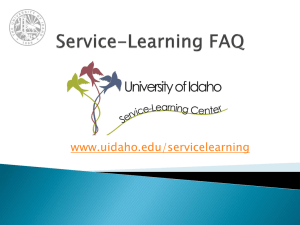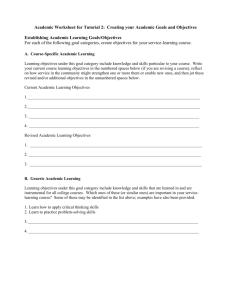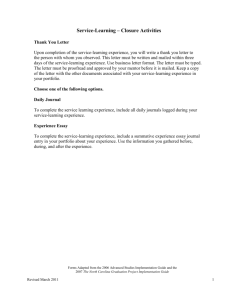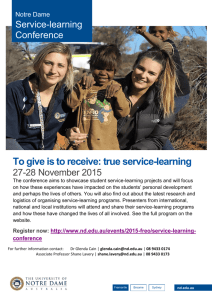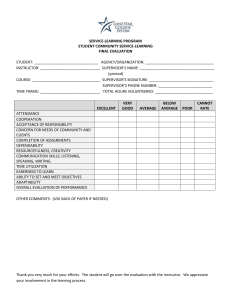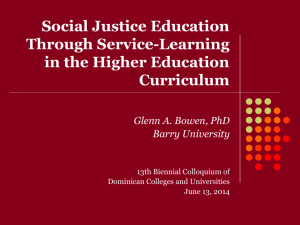Tennessee State University Service Learning and Civic Engagement
advertisement
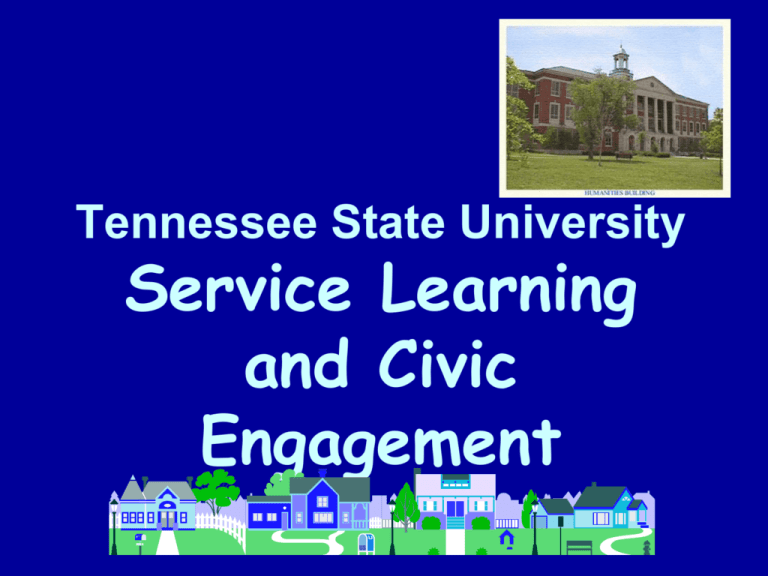
Tennessee State University Service Learning and Civic Engagement What is Service-Learning and Why Is It Important??? Dr. Deena Sue Fuller Director of ServiceLearning and Civic Engagement Tennessee State University This country cannot afford to educate a generation that acquires knowledge without ever understanding how that knowledge can benefit society or how to influence democratic decisionmaking. (From The Campus Compact Presidents’ Declaration on the Civic Responsibility of Higher Education.) What distinguishes servicelearning from other forms of experiential education? Service-Learning involves a balance between learning goals and service outcomes. SL is a Type of Experiential Education Community Service BENEFICIARY Student FOCUS Learning SERVICE-LEARNING COMMUNITY SERVICE EDUCATION VOLUNTEERISM FIELD PRACTICUM What is ServiceLearning??? • Service-Learning is a method of teaching that enriches learning by engaging students in meaningful service to their universities or communities through careful integration with established curricula. Service-Learning Service-Learning is a teaching method which combines community service with academic instruction as it focuses on critical, reflective thinking and civic responsibility. Service-learning programs involve students in organized community service that addresses local needs, while developing their academic skills, sense of civic responsibility, and commitment to the community. (Campus Compact) Look at the definitions and circle or highlight the words that are meaningful to you. Student Learning Meaningful Service THIS is Service-Learning National Commission on Service-Learning “…a teaching and learning approach that integrates community service with academic study to enrich learning, teach civic responsibility, and strengthen communities.” Service-learning is a structured learning experience that combines community service with preparation and reflection. Students engaged in service-learning provide community service in response to community-identified concerns and learn about the context in which service is provided, the connection between their service and their academic coursework, and their roles as citizens. Community service example If students remove trash from a streambed: they are providing a service to the community as volunteers Service-learning example • When students, who are taking an environmental education course, remove trash from a streambed, • analyze what they found, • share the results and offer suggestions for the neighborhood to reduce pollution, • and then reflect on their experience and the impact of their service THAT is service-learning! WHY SERVICE-LEARNING?? If effectively implemented…. Service-learning has many benefits for students, faculty, community members, and universities, alike. STUDENT BENEFITS • Reported increased learning and motivation • Deeper understanding of subject matter and complex social issues • Ability to apply course material in “real life” situations • Opportunity to learn from classmates’ experiences • Opportunities for collaboration and leadership experiences • Teaches job skills and prepares students for careers after college • Promotes deeper learning; there are no "right answers" in the back of the book COMMUNITY BENEFITS • Additional energy, enthusiasm, and resources for problem-solving • Improved relationship with university and access to university resources • Opportunity to recruit students as long term volunteers • Future staff potential UNIVERSITY BENEFITS • Opportunity to be a model servicelearning program for other universities • Improved student retention and school to work transition • Improved standing in the community • Demonstrate action for the public good Service-Learning helps students understand: • how communities function, • the kinds of problems they face, • the strength and richness of diversity, and • the importance of individual commitments of time and energy to enhancing community life. Service-Learning • contributes to civic learning • encourages a sense of civic responsibility • reduces stereotypes • strengthens the ability to empathize with others • promotes a more democratic citizenry Is service –learning the same as • • • • • • Field Experiences? Internships? Co-ops? Community Service? Volunteerism? internships Service-learning is not: • An episodic volunteer program • An add-on to an existing school or college curriculum • Completing minimum service hours in order to graduate • Service assigned as a form of punishment • Only for high school or college students • One-sided: benefiting only students or only the community Common characteristics of authentic service-learning • positive, meaningful and real to the participants • cooperative rather than competitive experiences; promotes teamwork and citizenship • addresses complex problems in complex settings rather than simplified problems in isolation • engages problem-solving in the specific context of service activities and community challenges, rather than generalized or abstract concepts from a textbook The Seven Elements of High-Quality Service-learning 1.Integrated Learning- clearly articulated learning outcomes 2. High Quality Service- meet actual community need 3. Collaboration- all partners benefit and contribute 4. Student Voice- students actively plan & participate 5. Civic Responsibility- contribute to and impacts the community 6. Reflection- connect service & academic learning 7. Evaluation- measure learning & service goals Civic Responsibility - The service-learning project promotes students’ responsibility to care for others and to contribute to the community. - By participating in the service-learning project, students understand how they can affect their community in positive ways. Reflection - Reflection establishes connections between students’ service experiences and the academic/developmental learning curriculum. - Reflection occurs before, during, and after the service-learning project. Learn more about servicelearning • • • • • www.servicelearning.org Campus Compact (compact.org) www.tsuservicelearning.com TN Campus Compact Corporation for National and Community Service (cns.gov) • Campus-Community Partnerships for Health Resources • Campus Compact (www.compact.org) – Sample syllabi in a wide variety of disciplines – Curriculum guides and publications – Professional development opportunities – Grants and awards Service Learning Classes English Chemistry History Geography Music Honors Nursing Design Education Early Childhood Psychology Engineering Health Phys. Edu. Communications Dental Hygiene Occupational Therapy Speech Pathology Public Service & Urban Affairs Consumer Sciences Diversity of Service Learning Projects Institute of Government Engineering Consumer Sciences Arts & Sciences Service Learning Education Business Nursing Health Sciences Cross-Disciplinary Collaborations Dental Screening & Cleaning Nursing Grace Eaton Daycare Speech & Hearing Physical Therapy Health Education Early Childhood Education Cross Disciplinary Education Programs Literacy Programs Computer Skills After-School Tutoring Education Mentoring Community Chorus Community Needs • • • • • • • • Tutors Mentors Program development Technology assistance Advocacy Training Needs Assessments Discipline-specific assistance


